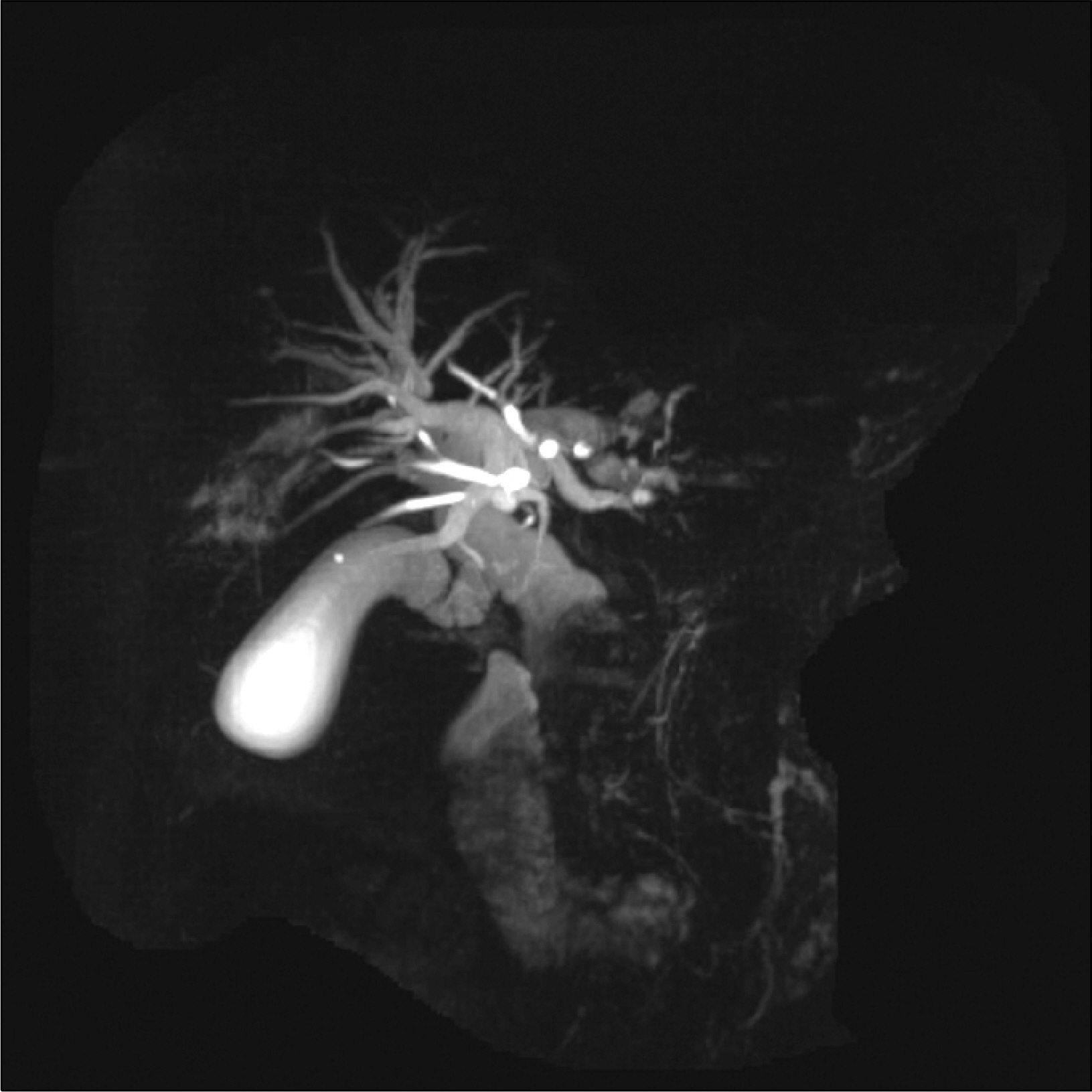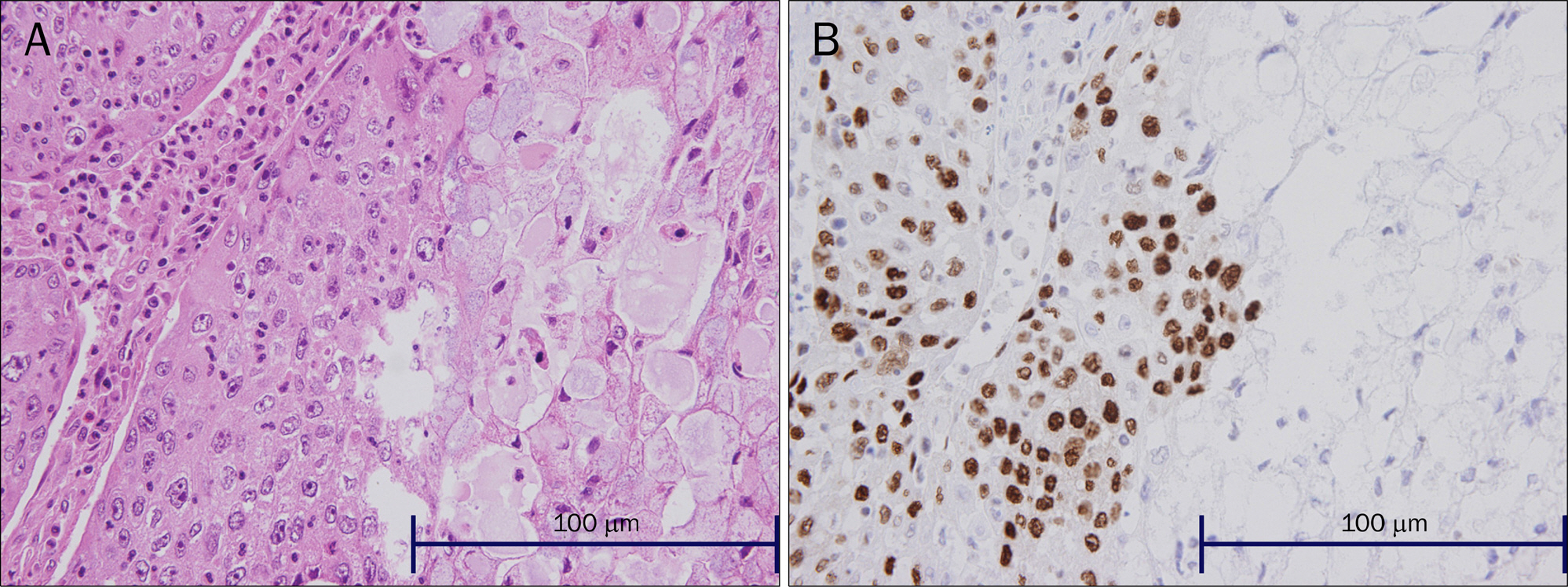Korean J Gastroenterol.
2011 May;57(5):319-322. 10.4166/kjg.2011.57.5.319.
A Case of Primary Mucoepidermoid Carcinoma Arising from the Common Bile Duct
- Affiliations
-
- 1Department of Internal Medicine, Seoul National University College of Medicine, Seoul, Korea. jkryu@snu.ac.kr
- 2Department of Pathology, Seoul National University College of Medicine, Seoul, Korea.
- 3Department of Surgery, Seoul National University College of Medicine, Seoul, Korea.
- KMID: 1792790
- DOI: http://doi.org/10.4166/kjg.2011.57.5.319
Abstract
- Mucoepidermoid carcinoma of the bile duct is an extremely rare tumor. Seventeen cases originating from intrahepatic bile duct and 2 cases from common hepatic duct have been reported in the English literature. Mucoepidermoid carcinoma arising from the common bile duct has not been previously reported. A 68 year-old man was admitted due to obstructive jaundice. Computed tomography showed a malignant tumor of the common bile duct located in the intrapancreatic segment. Filling defects of the distal common bile duct was seen on endoscopic retrograde cholangiogram. Under the impression of bile duct cancer, pylorus-preserving pancreatoduodenectomy was performed. Histologic diagnosis of the resected specimen was mucoepidermoid carcinoma of the common bile duct. After surgery, the patient received concurrent chemoradiotherapy, and planned to receive additional chemotherapy. We herein report on a first case of primary mucoepidermoid carcinoma of the common bile duct, and review the literature.
MeSH Terms
-
Aged
Antimetabolites, Antineoplastic/therapeutic use
Carcinoma, Mucoepidermoid/*diagnosis/surgery/therapy
Cholangiopancreatography, Endoscopic Retrograde
Combined Modality Therapy
Common Bile Duct Neoplasms/*diagnosis/surgery/therapy
Fluorouracil/therapeutic use
Humans
Male
Pancreaticoduodenectomy
Tomography, X-Ray Computed
Figure
Reference
-
References
1. Auclair PL, Goode RK, Ellis GL. Mucoepidermoid carcinoma of in-traoral salivary glands. Evaluation and application of grading criteria in 143 cases. Cancer. 1992; 69:2021–2030.
Article2. Arakawa Y, Shimada M, Ikegami T, et al. Mucoepidermoid carcinoma of the liver: report of a rare case and review of the literature. Hepatol Res. 2008; 38:736–742.
Article3. Koo J, Ho J, Wong J, Ong GB. Mucoepidermoid carcinoma of the bile duct. Ann Surg. 1982; 196:140–148.
Article4. Parker SL, Tong T, Bolden S, Wingo PA. Cancer statistics, 1997. CA Cancer J Clin. 1997; 47:5–27.
Article5. Khan SA, Thomas HC, Davidson BR, Taylor-Robinson SD. Cholangiocarcinoma. Lancet. 2005; 366:1303–1314.
Article6. Nakajima T, Kondo Y, Miyazaki M, Okui K. A histopathologic study of 102 cases of intrahepatic cholangiocarcinoma: histologic classification and modes of spreading. Hum Pathol. 1988; 19:1228–1234.
Article7. Pianzola LE, Drut R. Mucoepidermoid carcinoma of the liver. Am J Clin Pathol. 1971; 56:758–761.
Article8. Rullier A, Le Bail B, Fawaz R, Blanc JF, Saric J, Bioulac-Sage P. Cytokeratin 7 and 20 expression in cholangiocarcinomas varies along the biliary tract but still differs from that in colorectal carcinoma metastasis. Am J Surg Pathol. 2000; 24:870–876.
Article9. Klussmann JP, Gültekin E, Weissenborn SJ, et al. Expression of p16 protein identifies a distinct entity of tonsillar carcinomas associated with human papillomavirus. Am J Pathol. 2003; 162:747–753.
Article10. Pellegrini G, Dellambra E, Golisano O, et al. p63 identifies keratinocyte stem cells. Proc Natl Acad Sci U S A. 2001; 98:3156–3161.
Article11. Stewart FW, Foote FW, Becker WF. Mucoepidermoid tumors of salivary glands. Ann Surg. 1945; 122:820–844.
Article12. Bae KB, Kim TH, Choi YK, Paik NW. Surgical treatment and prognosis for 268 patients with biliary tract cancers. J Korean Surg Soc. 2000; 58:412–419.13. Jang JY, Kim SW, Park DJ, et al. Actual long-term outcome of extrahepatic bile duct cancer after surgical resection. Ann Surg. 2005; 241:77–84.
Article14. Kopelson G, Harisiadis L, Tretter P, Chang CH. The role of radiation therapy in cancer of the extrahepatic biliary system: an analysis of thirteen patients and a review of the literature of the effectiveness of surgery, chemotherapy and radiotherapy. Int J Radiat Oncol Biol Phys. 1977; 2:883–894.
Article15. Kim WC, Lee DH, Lee KY, et al. The role of postoperative radiation therapy in extrahepatic bile duct cancers. J Korean Soc Ther Radiol Oncol. 2003; 21:118–124.16. Kurosaki H, Karasawa K, Kaizu T, et al. Intraoperative radiotherapy for resectable extrahepatic bile duct cancer. Int J Radiat Oncol Biol Phys. 1999; 45:635–638.
Article17. Nelson JW, Ghafoori AP, Willett CG, et al. Concurrent chemoradiotherapy in resected extrahepatic cholangiocarcinoma. Int J Radiat Oncol Biol Phys. 2009; 73:148–153.
Article18. Fu KK. Radiation therapy with 5-fluorouracil in head and neck cancer. Semin Radiat Oncol. 1997; 7:274–282.
Article19. Laurie SA, Licitra L. Systemic therapy in the palliative management of advanced salivary gland cancers. J Clin Oncol. 2006; 24:2673–2678.
Article
- Full Text Links
- Actions
-
Cited
- CITED
-
- Close
- Share
- Similar articles
-
- A Case of Multiple Papillary Adenocarcinoma of the Extrahepatic Bile Duct : Findings of ERCP
- A Case of Cutaneous Metastasis of Distal Common Bile Duct Carcinoma
- A case of double primary cancer of hepatocellular carcinoma and mucoepidermoid carcinoma in the liver
- A Case of Primary Small Cell Carcinoma Arising from the Common Bile Duct
- Cytopathology of Metastatic Mucoepidermoid Carcioma of the Lung






